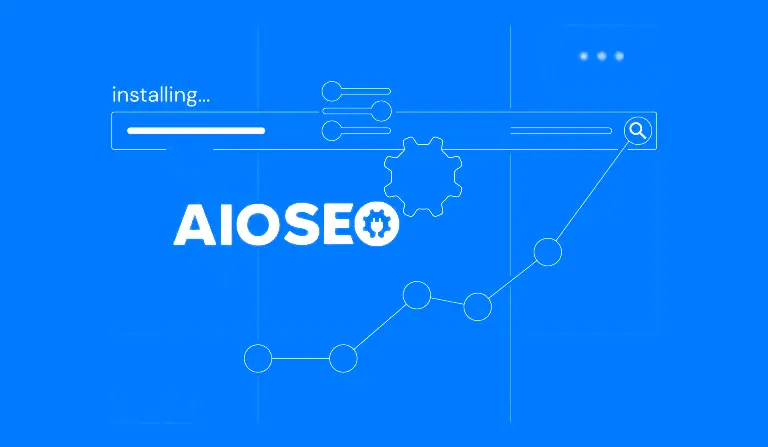You know that moment when you realize you really should optimize your website, but as soon as you see terms like “schema markup,” “robots.txt,” or “canonical tag,” you feel like bailing? Yep, I’ve been there too. Then I found AIOSEO — and it brought some serious order to that chaos. Not just once. I now have it installed on every WordPress site I run. And trust me, there’s quite a few of them.
First Impressions AIOSEO: Installation, Setup, and That Smooth Start
When I install a new plugin, I want it to just work — no 20-click setup rituals or digging through FTP. AIOSEO really surprised me here. As soon as I activated it, a simple setup wizard popped up and walked me through everything I needed to do. No fluff, just clear, logical steps.
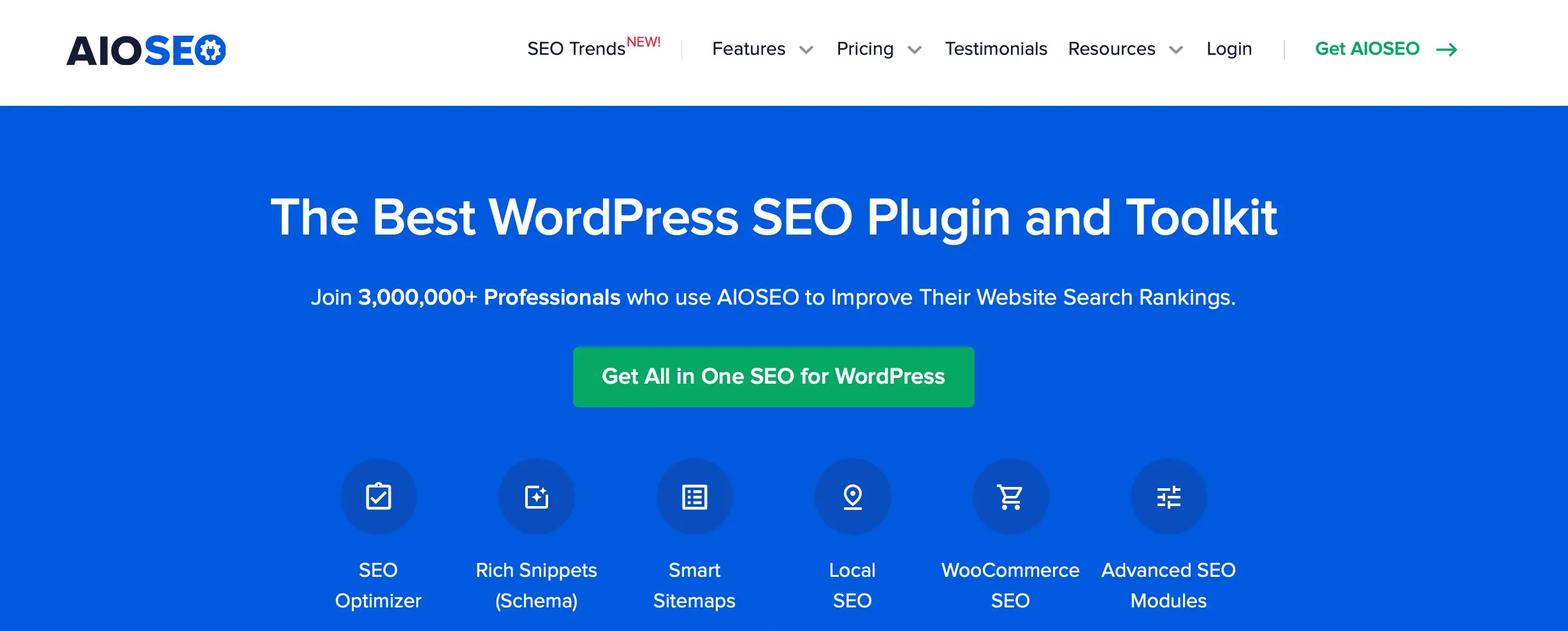
- Pick the type of site (blog, business, e-commerce…)
- Set your homepage title and meta description
- Add your social profiles and business logo
- Choose which SEO features to activate (XML sitemaps, breadcrumbs, WooCommerce SEO, etc.)
- And that’s it
The whole setup took me less than ten minutes, and I didn’t have to second guess a single option.
SEO Analysis That Actually Helps
One of the features I instantly loved was the SEO Audit. With just one click, the plugin scans my entire site and shows me what’s working — and what seriously needs attention. I get a clear list of things to fix: slow page speed, missing meta descriptions, not enough internal links, pages blocked from indexing that shouldn’t be… all the important stuff.
And then there’s the competitor analysis. Sounds like a buzzword, right? But in practice, it actually lets me compare my site to others in the same niche and see where I might be falling behind — or where I can sneak past them.
On top of that, AIOSEO has a built-in Headline Analyzer — a tool that taught me how to write titles people actually click on. And in SEO, that matters. A lot.
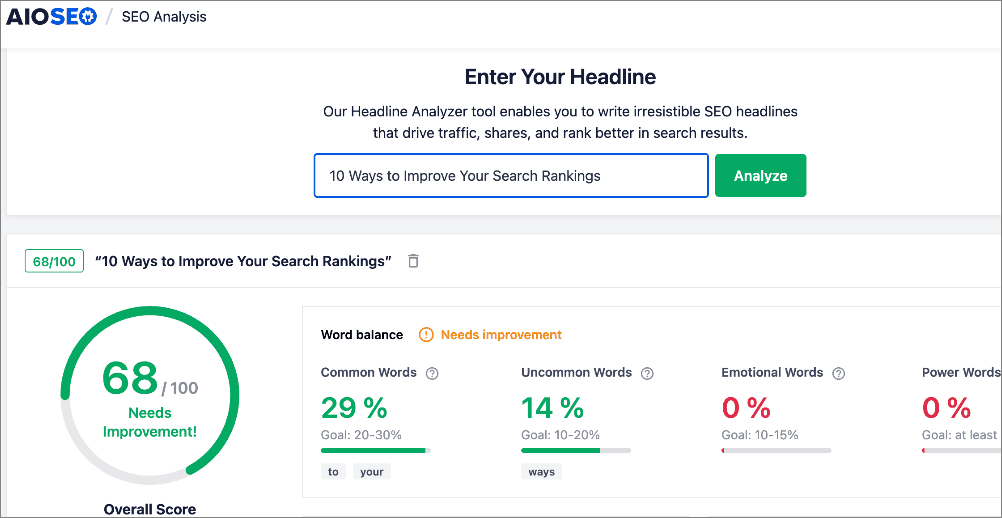
TruSEO: My Right Hand for Optimization
On every page or post I create, AIOSEO shows me an SEO score. I click it, and boom — it tells me if I’m using my focus keyword right: in the headline, meta, first paragraph, etc. It also checks if my content is readable, which, let’s face it, is just as important as pleasing search bots.
Their readability checks are super helpful — if I’m writing sentences that are way too long or too complex, I get a gentle reminder. And yes, I listen. Since I started paying attention to this, my bounce rates dropped and time-on-page improved across the board.
Link Assistant: Internal Linking Without the Pain
I used to manually create internal links or map them out in spreadsheets. That’s over now. AIOSEO’s Link Assistant scans my content and suggests where I should link to — and the best part? I don’t even have to open those other posts. I just select from a list and click “Add Link.”
It also shows me orphaned posts — articles that have no internal links pointing to them. Those are basically invisible to search engines. Now, whenever I spot one, I fix it right away. No more content left in the shadows.
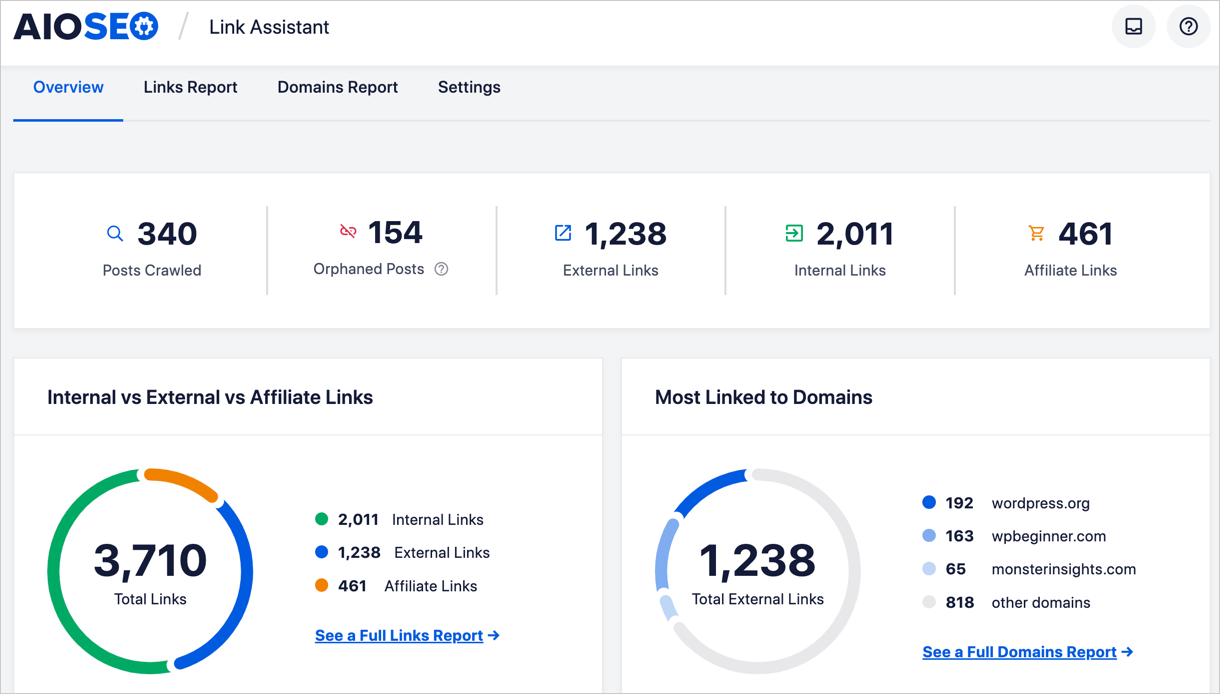
AI Tools That Actually Save Time
I honestly didn’t expect an SEO plugin to have such solid AI features, but AIOSEO delivered. My two favorites?
- AI Title/Description Generator – Once I finish a post, I click the button and get suggestions for SEO-optimized titles and meta descriptions. The results? Higher click-through rates, especially on content I updated.
- AI Writing Assistant – This is my secret weapon. It analyzes top-ranking pages for the same keyword and gives suggestions based on what’s actually working out there. It even recommends LSI keywords and shows how others are using them.
And the best part? You can use it on new content or while refreshing older posts.
Technical SEO Without the Headaches? AIOSEO Makes It Happen
SEO isn’t just about sticking keywords in your titles and opening paragraphs. That’s SEO 101. If you want Google to trust your site long term, your technical SEO needs to be tight — and this is where AIOSEO really shines.
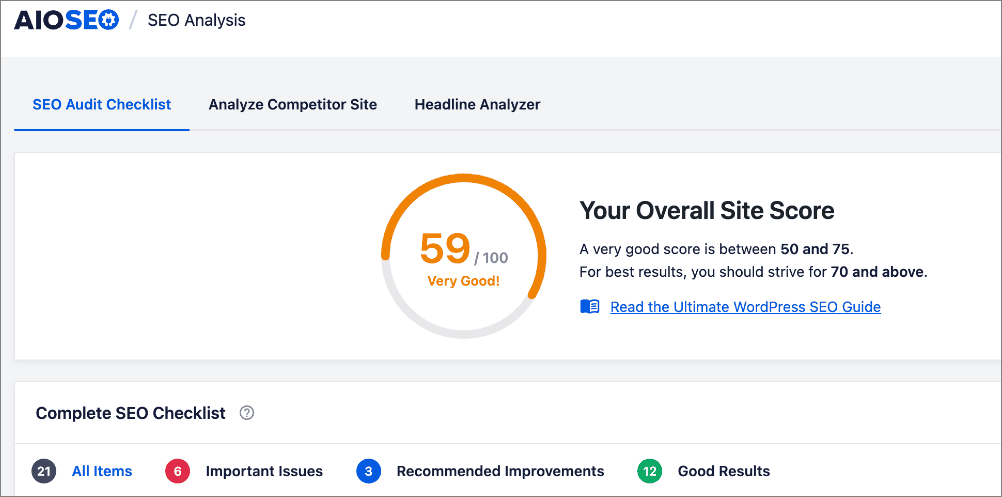
Schema Markup? Yes, and No Coding Required
I used to handle schema manually. I’d mess with JSON-LD code, run it through Google’s validator, debug errors… it was a whole ordeal. Then I tried the AIOSEO Schema Generator, and man, what a difference.
Just choose the schema type — article, product, event, recipe, whatever — and the plugin takes care of everything. It even supports custom schema types, so if you’re doing something niche like reviewing camping gear, you’re covered.
And yes, it outputs everything as proper JSON-LD structured data — the format Google loves most.
Redirect Manager: Smooth Navigation, No Broken Links
If your site’s growing, you know the nightmare that is managing redirects. Old URLs, updated permalinks, deleted pages… it adds up fast. AIOSEO’s Redirect Manager has saved me more than once:
- Supports 301, 302, 307 redirects — plus rare types like 451 or 410
- Automatically logs every redirect, including IPs and referrers
- Detects 404 errors and suggests smart fixes
- Handles wildcard and regex rules
- You can even import redirects from a CSV file (huge for client projects)
Need to redirect an entire website? Yep, it can do that too. All from the dashboard. No more messing with .htaccess or third-party tools.
Sitemap Generator: Not Just Another XML File
I expected the usual XML sitemap. But AIOSEO gave me more:
- News sitemaps for publishing sites
- Video sitemaps for media-heavy content
- RSS and HTML sitemaps too
- Control exactly which content appears
- And best of all – automatic integration with Google Search Console
It updates every time I publish or change content, so search engines always see the latest version of my site.
Robots.txt Editor: Total Crawl Control
This used to be something I ignored. Or worse, I’d copy-paste some random robots.txt from a tutorial without really knowing what it did. But with AIOSEO’s built-in Robots.txt Editor, I finally took control.
I can:
- Block low-priority or duplicate content
- Keep bad bots (like content scrapers) out
- Prioritize crawl budget toward key pages
- Add crawl delays or sitemap links
No FTP needed. No extra plugins. Just one click from the admin dashboard and I’m in full control.
Breadcrumbs Done Right
Breadcrumbs aren’t just helpful for users — they’re great for SEO too. And AIOSEO’s implementation is spot-on:
- Choose the primary category (important when you’ve got multiple)
- Add breadcrumbs via shortcode, widget, Gutenberg block, or PHP
- Auto-generates schema markup for rich snippets
It’s a set-it-and-forget-it setup. Once implemented, I noticed better page depth indexing and users spent more time browsing related content.
WooCommerce SEO: E-Commerce Without SEO Gaps
One of my clients runs a WooCommerce shop, and AIOSEO made optimization a breeze:
- Dynamic product titles and meta descriptions using smart tags
- Auto-filled image alt attributes
- Redirects attachment pages to avoid thin content
- Separate WooCommerce-specific sitemap
- Google Merchant Center schema built right in
I can also customize SEO settings by product category, brand, or tag. That level of control is rare in plugins.
Local SEO: A Must-Have for Brick-and-Mortar Businesses
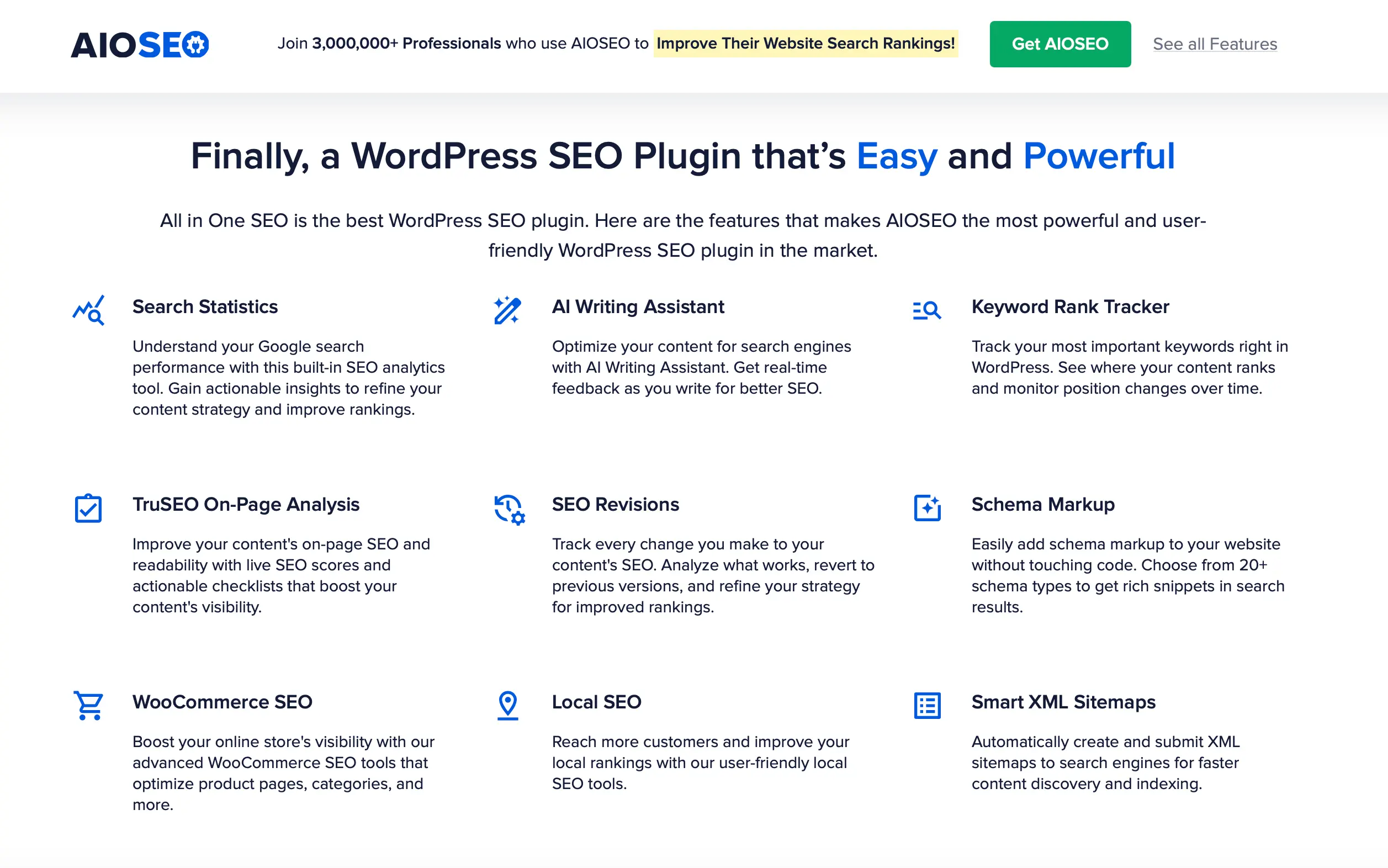
If you run any business with a physical location, AIOSEO’s Local SEO module is a total game changer. It’s not just about dropping your address in the footer anymore.
Here’s what I can configure in minutes:
- Full NAP (name, address, phone number)
- Opening hours
- An interactive Google Map embed
- Local business schema markup
Got multiple locations? No problem. Each one gets its own custom info, bio, and coordinates. Perfect for companies with multiple branches trying to rank in specific cities.
Author SEO and Google E-E-A-T: Show You Know Your Stuff
This one hits home for me — especially as someone who actually writes their own content. Google now evaluates content using E-E-A-T: Experience, Expertise, Authoritativeness, and Trustworthiness. And if you’re in any YMYL niche (your money, your life), this stuff is critical.
Out of the box, WordPress doesn’t give you much. But AIOSEO’s Author SEO module lets you go deeper:
- Add your bio, areas of expertise, languages, certifications, even awards
- Link social media profiles
- Assign topics or industries you specialize in
All of this is then wrapped in structured JSON schema, which Google uses to verify that yes — you’re a real human with real knowledge. I added my background in tech, SEO, and VPN testing to my author schema, and it feels great knowing that Google sees it.
Search Statistics: Google Search Console, Reimagined
Let’s be honest — GSC is useful but not exactly fun to use. Most people never even look at it. That’s why I love AIOSEO’s Search Statistics module.
It pulls your most important SEO data right into your WordPress dashboard:
- Keyword rankings
- Page impressions and clicks
- Average CTR and positions
- Performance breakdown by page
- And yes — it even tracks content decay
That last one is huge. I’ve rescued multiple blog posts that were slowly losing rankings just because they aged out. With one glance at the Content Decay tab, I knew exactly what needed updating.
And the Keyword Rank Tracker? No more paying for third-party rank tracking tools. I can:
- Add keywords manually
- Import them from GSC
- Upload via CSV
- Or pull them straight from my target keyphrases
Once they’re in, I get a clean overview of my ranking progress — all from within WordPress. It’s the kind of data-driven insight I used to pay good money for.
SEO User Roles: Control Without Chaos
If you manage a team, you know what a single misclick can do to your SEO. That’s why I’m so glad AIOSEO lets me define custom SEO roles.
I set permissions like this:
- Writers can draft content, but not touch meta tags
- Editors can handle on-page SEO, but not sitemaps or redirects
- Only admins (me) have full access
No more broken settings, no more unauthorized changes. Everything stays neat, tidy, and under control.
Pricing: AIOSEO Doesn’t Break the Bank
A lot of people ask me why I pay for an SEO plugin when there are free ones out there. And it’s a fair question. Yes, AIOSEO offers a free version, and it’s honestly better than many competitors’ paid plans. It’s perfect for small blogs or anyone just starting out.

But if you’re serious about SEO, the paid versions are a no-brainer.
Here’s a quick breakdown:
- Basic Plan – $49.60/year for 1 site
- Plus Plan – $99.60/year for up to 3 sites
- Pro Plan – $199.60/year for up to 10 sites
- Elite Plan – $299.60/year for up to 100 sites
I personally use the ELITE Plan — for all client work and my own private projects (just renewed it for another year today). Compared to the value it provides, the price is peanuts. Plus, it comes with priority support, which — spoiler alert — is top-notch.

Support: Actually Helpful, Not Just Lip Service
AIOSEO support is one of the reasons I’ve stuck with them for years.
Every time I’ve needed help — whether it was a compatibility issue or just a “how do I do this?” moment — they responded quickly and explained things clearly. It doesn’t feel like you’re talking to a bot or being sent generic copy-paste answers. You’re talking to people who understand SEO and WordPress.
And if you prefer to figure things out yourself, their documentation and tutorials are on point. I’ve solved most of my issues just by reading their guides — without ever submitting a ticket.
Final Verdict: AIOSEO Still Reigns Supreme
After years of using this plugin on dozens of sites, testing it against competitors, and seeing the results first-hand, I can confidently say this:
AIOSEO is the best SEO plugin for WordPress. Period.
It’s powerful but still user-friendly, it scales whether you’re managing one site or a hundred, and the team behind it is constantly improving it.
It’s saved me countless hours, helped my content rank better, and given me confidence that my SEO foundation is solid — without needing to patch together ten other tools.
If you’re using WordPress and care about SEO, go install AIOSEO. And if you’re on the fence about the paid version — just do it. One good ranking article will more than pay for it.
Frequently Asked Questions (FAQ)
Is AIOSEO free or do I need a paid version?
Yes, AIOSEO offers a free version with essential SEO tools. However, if you’re serious about growing your traffic, the Pro version is absolutely worth the upgrade.
Can AIOSEO replace other plugins like Rank Math or Yoast?
In my experience — yes. I’ve used all three, and AIOSEO combines the best of both worlds: beginner-friendly setup and advanced tools for power users.
Does AIOSEO help with local SEO and Google Maps?
Absolutely. The Local SEO module lets you set NAP info, embed Google Maps, and generate local schema markup to boost your visibility in local searches.
Can I track my keyword rankings inside WordPress with AIOSEO?
Yes! Thanks to its Search Statistics feature, AIOSEO tracks keyword rankings, search impressions, and content decay — directly in your dashboard.
Is AIOSEO good for e-commerce or WooCommerce stores?
Definitely. It optimizes product titles, meta descriptions, schema, and sitemaps — plus supports Google Merchant Center for better product visibility.
How beginner-friendly is AIOSEO for someone new to SEO?
It’s one of the most intuitive SEO plugins out there. The setup wizard, AI tools, and TruSEO score make it incredibly easy even for total beginners.








